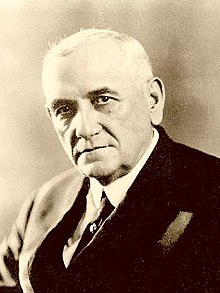Henry L. Fuqua
| Henry Luse Fuqua | |
|---|---|

Henry L. Fuqua
|
|
| 38th Governor of Louisiana | |
|
In office May 13, 1924 – October 11, 1926 |
|
| Lieutenant | Oramel H. Simpson |
| Preceded by | John M. Parker |
| Succeeded by | Oramel H. Simpson |
| Personal details | |
| Born |
November 8, 1865 Baton Rouge, Louisiana, USA |
| Died | October 11, 1926 (aged 60) Baton Rouge, Louisiana |
| Resting place | Roselawn Memorial Park and Mausoleum |
| Political party | Democratic |
| Alma mater |
Magruder's Collegiate Institute |
| Occupation | Prison warden; Businessman |
| Religion | Episcopalian |
Magruder's Collegiate Institute
Henry Luse Fuqua, Sr. (November 8, 1865 – October 11, 1926), was a Baton Rouge businessman and, for his last two and a half years, a Governor of Louisiana. During 1924, Fuqua defeated both Huey Pierce Long, Jr., and former Speaker of the Louisiana House of Representatives Hewitt Leonidas Bouanchaud to succeed John M. Parker in the state's governorship. He died halfway into his term, and Lieutenant Governor Oramel H. Simpson took over the top post.
Fuqua was born in Baton Rouge to James Overton Fuqua and the former Jeanette Fowles. He was educated at Magruder's Collegiate Institute and Louisiana State University, both in Baton Rouge. On June 4, 1890, Fuqua married the former Marie Laure Matta (1866–1968), and they had two children, Matta Fuqua Scott (1891-1980), James Overton Fuqua (1893-1900), and Henry L. Fuqua, Jr. (1905-1992).
Prior to his entry into politics, Fuqua was the assistant to construction engineers of the Yazoo and Mississippi Valley Railroad. He was later a clerk and traveling salesman. He owned and operated his Fuqua Hardware Company in Baton Rouge from 1883 to 1922.
In 1916, Fuqua became the warden of the Louisiana State Penitentiary at Angola in West Feliciana Parish north of Baton Rouge. He held the position until he became governor.
As warden, he terminated most of the security officers at the penitentiary and instead placed selected inmate trusty guards on duty, primarily as an economic measure but also to encourage cohesion among the inmates. Fuqua abolished stripes on convict uniforms. The former prison in Baton Rouge was sold to the city and dismantled.
...
Wikipedia
